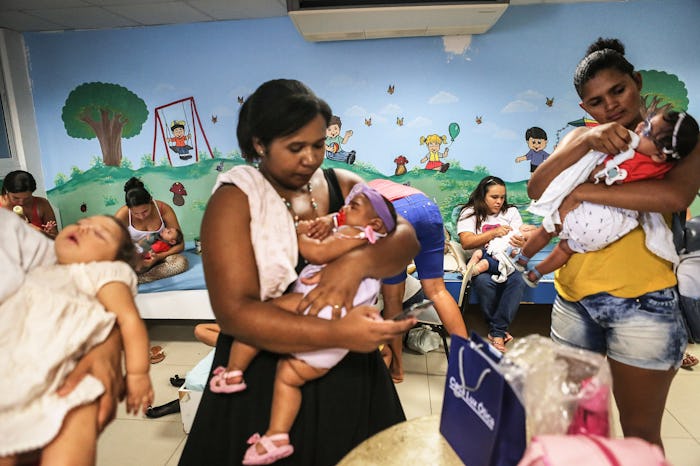Life

Why Is Zika Spreading So Quickly? Travelers Spread The Virus To New Areas
As the Summer Olympic Games in Rio de Janiero approach, fears continue to mount about the risk both athletes and spectators are taking when traveling to Brazil, one of the first locations to identify a widespread Zika outbreak in the Americas. But why is Zika spreading so quickly? People are traveling more than ever and bringing Zika along too.
On Feb. 18, 2016, the Centers for Disease Control issued a statement saying it was elevating its response to Zika to what the organization calls a "Level 1 activation," the highest level of response to an infectious disease. Prior to 2015, the CDC said Zika had only been found in Africa, Southeast Asia, and the Pacific Islands.
In 2007, researchers found about 73 percent of the population over the age of 3 had been infected with Zika on the tiny island of Yap, with only about 10,000 residents, in the Western Pacific, according to PBS' Frontline. But in 2013, Pacific islanders brought Zika to the Americas. Frontline reported that one researcher has traced the origin of Zika to the August 2014 canoe race, Va'a World Sprint Championship, which had competitors from Zika infected islands including French Polynesia, Easter Island, and the Cook Islands.
By October, Frontline said, doctors in Brazil started seeing a correlation between Zika and babies being born with microcephaly, a catastrophic birth defect that causes brain damage in babies born to mothers infected with Zika during their pregnancies. Those doctors then sounded the alarm. Zika was declared a "global health emergency" by the World Health Organization on Feb. 1, 2016, according to CBS News.
Now Central and South America and the United States are grappling with trying to prevent the spread of Zika. And while no one has been infected with Zika in the U.S. via local transmission just yet, more than 800 cases of Zika have been brought into the U.S. by international travelers. Zika can be spread by a bite from an infected mosquito, or through sexual contact with someone infected with the Zika virus.
Which is why there is so much concern over the 2016 Summer Olympics being held in Brazil, right in the middle of the area hardest hit by the recent Zika outbreak. A number of high profile athletes from all over the world have pulled out of the Olympics citing Zika as the reason. By the end of May, Brazil had confirmed 1,434 cases of Zika-related microcephaly, with an additional 3.257 suspected cases, according to Fox News.
Brazilian soccer star Rivaldo even issued an ominous warning to fans who were considering making the trip to see the Rio Games in person, according to the Business Insider, posting a message to his Instagram that read, "I advise everyone with plans to visit Brazil for the Olympics in Rio — to stay home. You'll be putting your life at risk here."
On Tuesday, top Australian golfer Jason Day joined Ireland's Shane Lowry in pulling out of the Olympics because of Zika fears, the Business Recorder reported. A number of Team USA basketball players, including Knicks star Carmelo Anthony, also expressed concerns about contracting Zika while attending the Rio Games, but have decided to go anyway.
But Dr. David Heymann, the WHO emergency Zika committee chair, said the risk of the Zika outbreak growing internationally as a result of the Olympics is "very low," according to The Guardian. Why? The weather in Brazil is getting colder, killing off the primary carrier of Zika, the Aedes mosquito, according to NBC News.
Nonetheless, the CDC, according to its site, is sticking with its extensive travel warnings for risk of Zika, which lists Brazil and many other South and Central American countries as places to avoid.